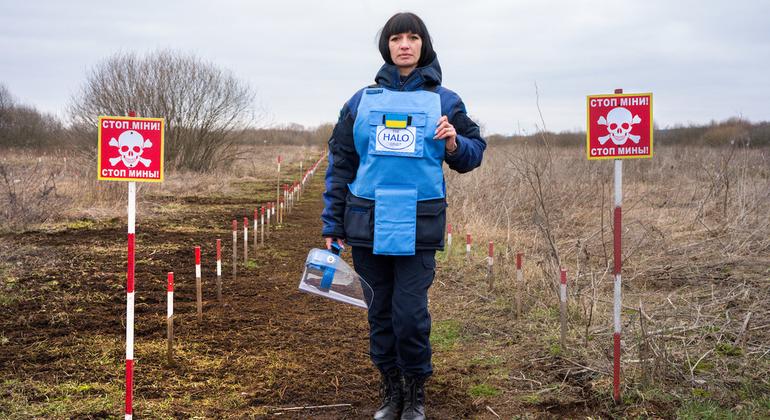
A programme to clear agricultural lands of war remnants was launched by FAO in collaboration with WFP and the Swiss Foundation for Memory. Reviving Ukraine’s agro-industry: demining, investment, “green” technologies Economic development
The war that began in February 2024 has caused enormous damage to agriculture and food production in Ukraine. The Food and Agriculture Organization of the United Nations (FAO), in a joint effort with other UN agencies, is currently clearing fields of mines to help small farmers and rural families safely return to their lands and resume food production.
The FAO programme consists of three phases. The first phase involves mapping lands in need of mine action using satellite imagery. In the second phase, technical teams survey and clear mined lands. In the last phase, farmers receive technical and financial support to resume production in cleared areas.
The joint programme to clear agricultural lands of remnants of war was launched by FAO in collaboration with the UN World Food Programme and the Swiss Foundation for Remembrance.
Sergey Kokhan, whose farm in the Kharkiv region was heavily damaged by the war, is now preparing to resume production with the support of the mine action programme.
“The initial assessment of the upcoming demining work began in 2023,” says the farmer. “Then, already this year, we started a technical survey of the fields. To date, 15 hectares out of 24 have been cleared. Now we plan to set up a trial field and sow winter crops.”
Following the escalation of the war in 2022, FAO has been implementing a comprehensive technical response to support agriculture and food production in Ukraine to help farmers and producers in one of the world’s largest cereal exporters get their harvests, preserve livestock, and strengthen supply chains.
Assessment of the chemical status of the soil
FAO also plays a central role in ensuring food safety by assessing the soil health of land potentially contaminated by remnants of war. This is done to determine the extent of chemical damage to the land and how such contamination may affect specific crops.
“The soil assessment serves two purposes,” explains Tiffany Lucas, coordinator of FAO’s Mine Action and Land Restoration Programme in Ukraine. “Firstly, the experts will provide the government with data that will help develop policies and take measures to mitigate the impact of soil contamination. It is also a tool that will allow us to build a model to predict potential risks to key crops grown in specific regions of Ukraine.”

Production Recovers Despite War
Before the current round of armed conflict, Ukraine exported about six million tons of grain per month. The country’s agricultural sector produced enough food to feed 400 million people worldwide.
This year, Ukraine has harvested 72.9 million tonnes of cereals and oilseeds and exported 17.5 million tonnes of cereals, pulses and flour, exceeding last year’s figures but still below pre-war levels.
FAO Resource Mobilization Director Alexander Jones spent a week in Ukraine, meeting with donors and key food producers.
“I am very impressed with the ability of Ukrainian agriculture to respond to an extremely challenging, crisis-affected situation, exacerbated by labour shortages and high energy, transportation and insurance costs,” he said. “FAO is doing a tremendous job here to fully revive the agricultural sector, providing various types of resource support to more than a quarter of a million people.”
Since February 2022, FAO and partners have provided 250,000 rural families with vegetable and seed potatoes, animal feed, vouchers and cash assistance. More than 13,000 farmers have received temporary grain storage containers, generators and cash grants, allowing them to resume production and strengthen value chains.
Green Technologies
Through programmes funded by the European Union, FAO promotes investments in solar energy systems and modern irrigation technologies, increasing energy efficiency and improving water management.
These technologies, already adopted by some food producers, not only mitigate the effects of climate change, but also help reduce their carbon footprint.
One of the beneficiaries of this programme is Sergey Lenchuk, Director of Galicia Greenery LLC. His company, which mainly produces lettuce, has received financial support from the European Union and has purchased solar panels to generate electricity in its greenhouses.
“Thanks to the solar panels, we will be able to cover our basic energy needs during the summer,” says Lenchuk.
Strengthening its collaboration with international donors and the Ukrainian government, FAO intends to continue focusing on renewable energy systems for agribusiness and the reconstruction of Ukraine’s war-damaged infrastructure.
